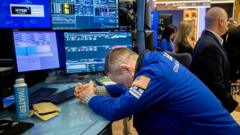This article examines how Trump’s mixed signals on tariffs are affecting the stock market, investors' reactions, and the potential consequences for the US and global economies.
Tariff Turmoil Sends US Stocks on a Wild Ride

Tariff Turmoil Sends US Stocks on a Wild Ride
US markets are experiencing significant volatility amidst escalating tariff threats from President Trump, with mixed investor sentiment.
In a whirlwind trading day, the US stock markets faced wild fluctuations as investors grappled with President Donald Trump's shifting stance on tariffs. The S&P 500 index, which represents the performance of 500 major US companies, ended down by approximately 0.2%, following dramatic trading movements reminiscent of the volatility seen during the Covid-19 pandemic. Despite the slump, traders held onto hopes that Trump might pivot from imposing tariffs to establishing more favorable trade agreements.
Compounding concerns, Trump amplified his tariff threats against China while simultaneously indicating that trade talks with other nations, including Japan, were forthcoming. He characterized his tariff policy as a dual strategy, asserting that while some tariffs may be permanent, others would be subject to negotiation. The White House has purportedly received inquiries from over 50 countries regarding trade relations.
Analysts are drawing parallels to past market downturns, noting that the S&P 500 has lost over 10% of its value within just three days, an alarming pace reminiscent of the 2008 financial crisis and early Covid-19 market responses. Experts highlight that investor frustration stems from the unpredictable nature of current policies, with high-profile business leaders like Jamie Dimon and Bill Ackman voicing concerns over the fallout from the ongoing market turbulence.
On top of the pre-existing tension, Trump threatened a staggering 50% additional tariff on imports from China unless Beijing rolls back its own recent retaliatory measures. This escalation could lead to a total tax of at least 104% on Chinese goods entering the US. The acute uncertainty surrounding trade relations is spooking investors, who are increasingly worried about impacts on corporate profits and broader economic growth, according to Russ Mould, director at AJ Bell.
Market reactions were swift, as the S&P 500 briefly approached bear market territory, indicating a potential drop of over 20% since its peak in February. However, a rumor that tariffs might be postponed sparked a brief rally, with shares soaring upwards of 7%. Despite this, Howard Silverblatt from S&P Dow Jones indices noted that such drastic swings are rare, reflecting the significant uncertainty prevailing in the marketplace.
European indices mirrored US markets, with London's FTSE 100 suffering a decline of 4.4%, and major indexes throughout Asia also experiencing steep losses. Oil prices fell more than 4% but later showed signs of recovery, while industrial copper prices dipped about 3%. Meanwhile, gold prices, often seen as a safer investment haven, also witnessed declines amidst the turmoil.
As world leaders continue to navigate the complexities posed by Trump's tariff agenda, analysts remain cautious about the broader implications such trade disputes might have on both domestic and global economies. The ongoing situation necessitates close monitoring as markets attempt to stabilize in the face of ever-shifting trade policies.
Compounding concerns, Trump amplified his tariff threats against China while simultaneously indicating that trade talks with other nations, including Japan, were forthcoming. He characterized his tariff policy as a dual strategy, asserting that while some tariffs may be permanent, others would be subject to negotiation. The White House has purportedly received inquiries from over 50 countries regarding trade relations.
Analysts are drawing parallels to past market downturns, noting that the S&P 500 has lost over 10% of its value within just three days, an alarming pace reminiscent of the 2008 financial crisis and early Covid-19 market responses. Experts highlight that investor frustration stems from the unpredictable nature of current policies, with high-profile business leaders like Jamie Dimon and Bill Ackman voicing concerns over the fallout from the ongoing market turbulence.
On top of the pre-existing tension, Trump threatened a staggering 50% additional tariff on imports from China unless Beijing rolls back its own recent retaliatory measures. This escalation could lead to a total tax of at least 104% on Chinese goods entering the US. The acute uncertainty surrounding trade relations is spooking investors, who are increasingly worried about impacts on corporate profits and broader economic growth, according to Russ Mould, director at AJ Bell.
Market reactions were swift, as the S&P 500 briefly approached bear market territory, indicating a potential drop of over 20% since its peak in February. However, a rumor that tariffs might be postponed sparked a brief rally, with shares soaring upwards of 7%. Despite this, Howard Silverblatt from S&P Dow Jones indices noted that such drastic swings are rare, reflecting the significant uncertainty prevailing in the marketplace.
European indices mirrored US markets, with London's FTSE 100 suffering a decline of 4.4%, and major indexes throughout Asia also experiencing steep losses. Oil prices fell more than 4% but later showed signs of recovery, while industrial copper prices dipped about 3%. Meanwhile, gold prices, often seen as a safer investment haven, also witnessed declines amidst the turmoil.
As world leaders continue to navigate the complexities posed by Trump's tariff agenda, analysts remain cautious about the broader implications such trade disputes might have on both domestic and global economies. The ongoing situation necessitates close monitoring as markets attempt to stabilize in the face of ever-shifting trade policies.


















